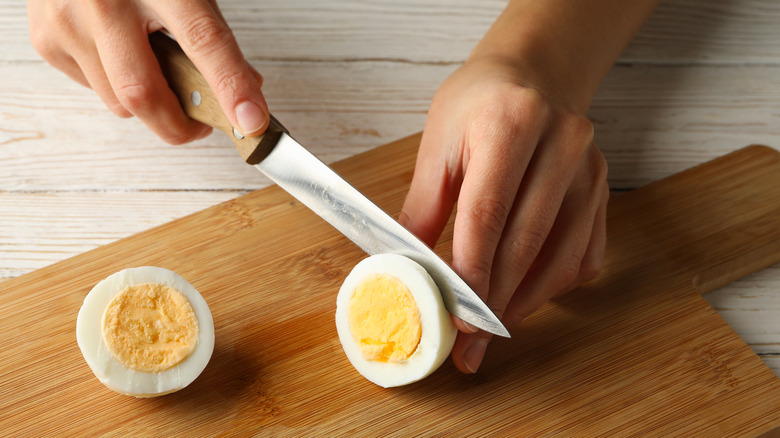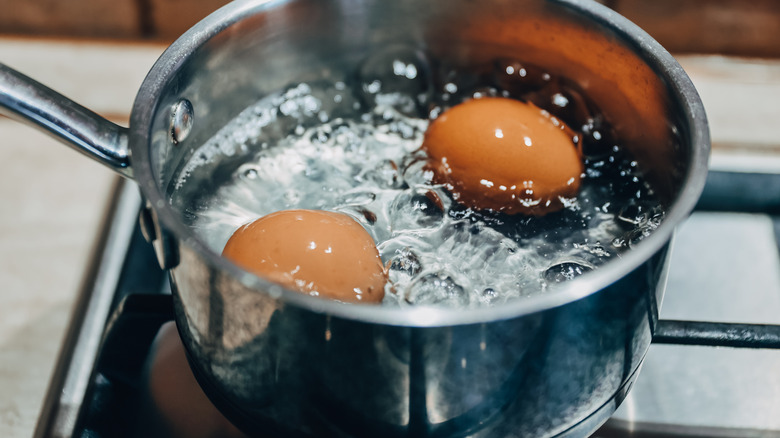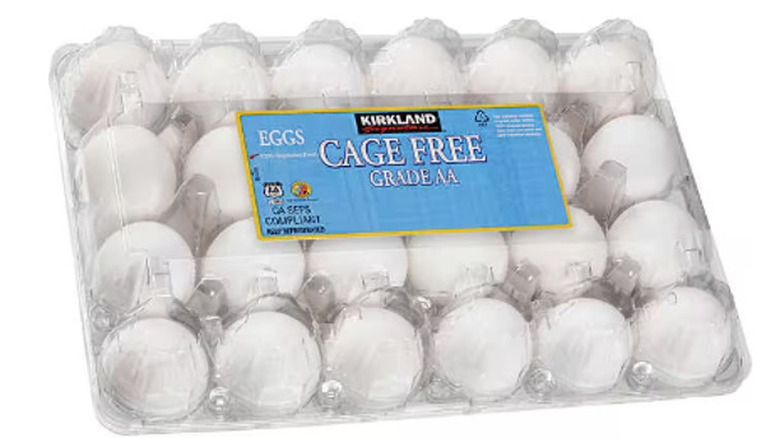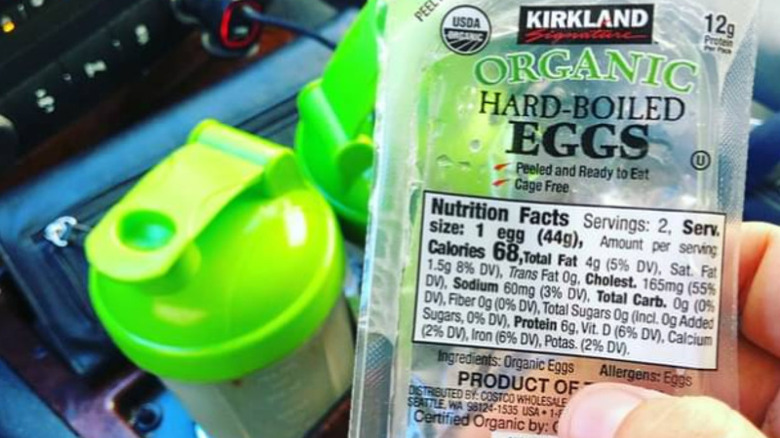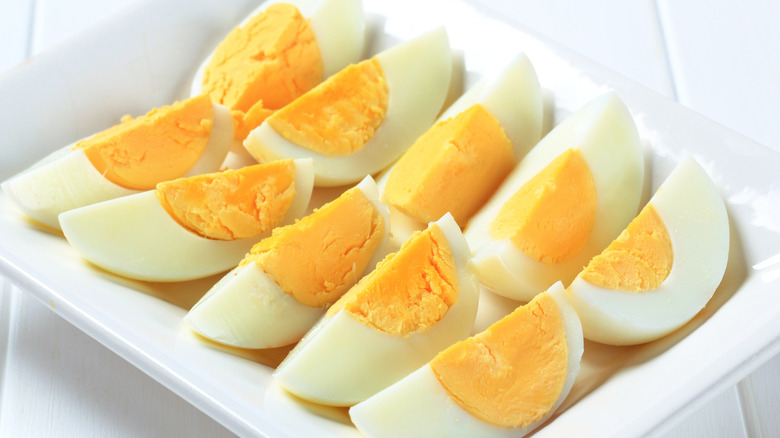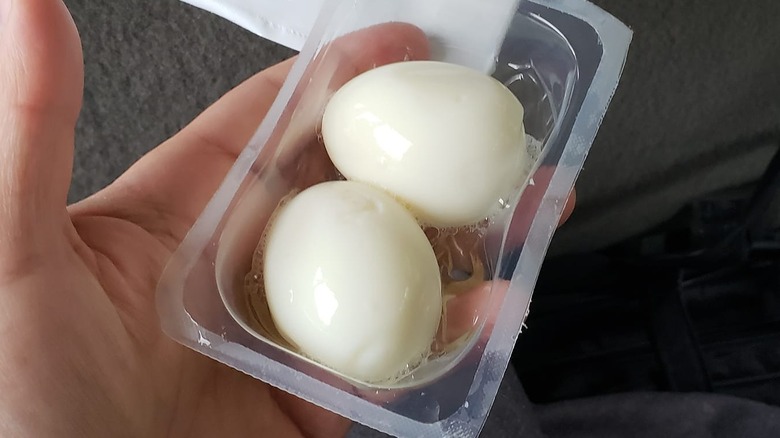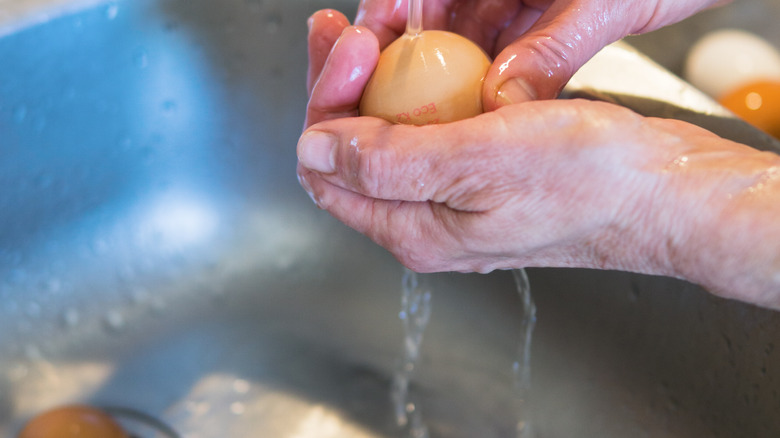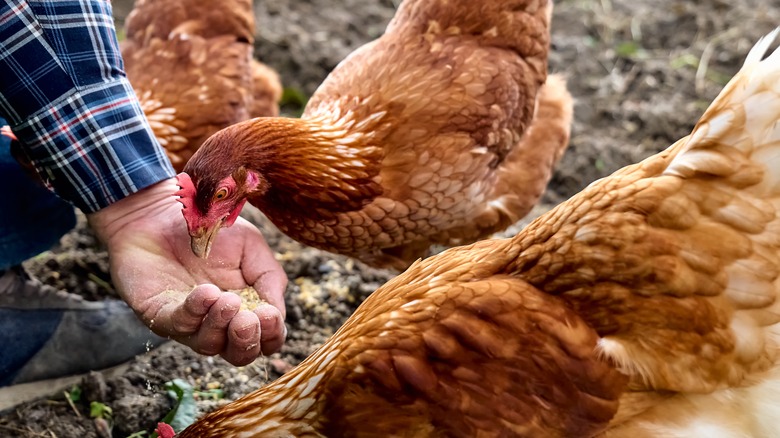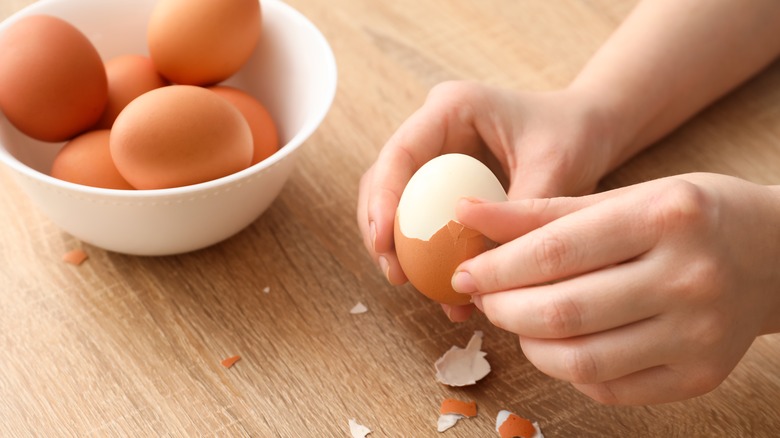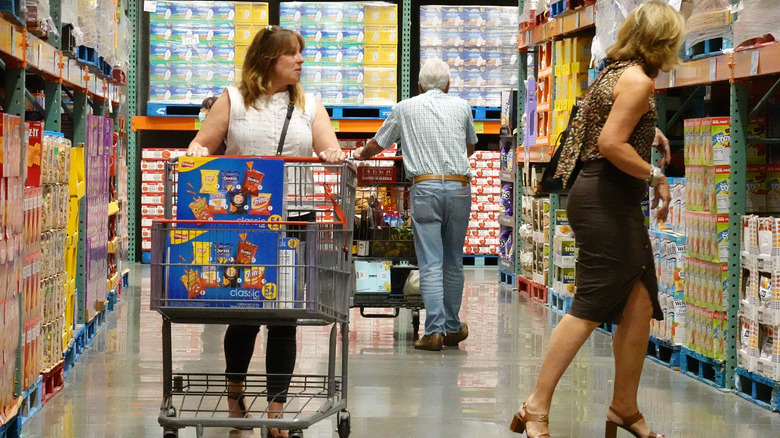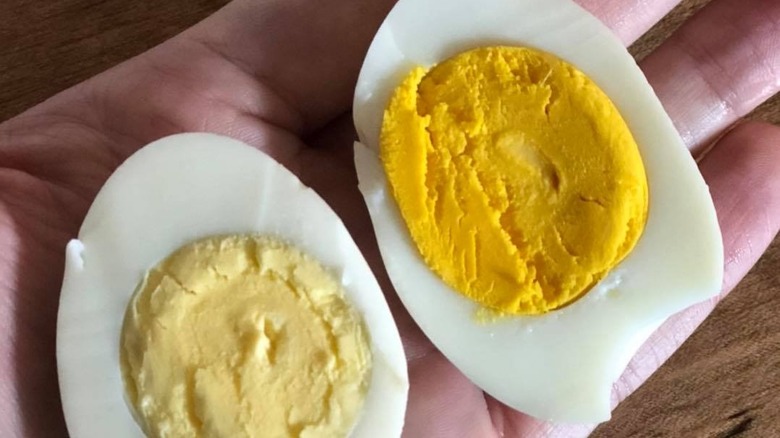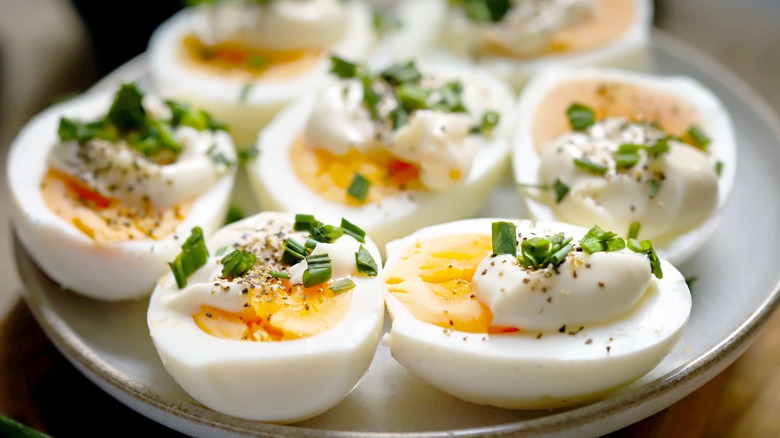Everything You Need To Know About Costco's Kirkland Hard-Boiled Eggs
Ahh, the hard-boiled egg. It's a timeless treat rumored to have been on the menu as far back as Roman times. These popular egg variants, which are cooked in a pot of boiling water with their shells still intact, are cracked and peeled to reveal a smooth, delicious, and versatile bite packed with about 7 grams of protein to power your day.
But, alas, the biggest downside to the snack is often preparing it. Maintaining doneness in the middle across a whole batch can be a challenge for some, while getting the crackly peel to slide off cleanly can feel impossible for others. Since many people struggle to get their hard-boiled eggs just right, many grocery stores — Costco included — have swooped in, developing ready-made and pre-peeled products to help take the challenge out of the process. Costco's bulk-sized box of Kirkland Signature organic hard-boiled eggs has become a staple for egg sandwich devourers and Cobb salad consumers everywhere ... and as it turns out, these orb-shaped nibbles are actually a pretty interesting product. So what is the scoop — or should we say, the peel — on Kirkland's hard-boiled delights? Well, we did a little digging and uncovered some tidbits hiding out just beneath the shell of the popular product. Here's everything you need to know about Costco's Kirkland hard-boiled eggs.
They are more expensive than boiling your own would be
While Kirkland's hard-boiled eggs are incredibly easy to unwrap and eat on a whim, you do pay for the convenience. According to Costco Food Database, a package of 32 pre-cooked organic eggs goes for $9.99 on average. While this might not sound too steep in and of itself, when compared with the current price of standard raw eggs, it feels much more so.
Go Banking Rates reports that the average cost of standard raw grocery store eggs has dropped by 45% between January and May of this year. This is a huge financial relief after the avian flu wreaked havoc on America's hens at the start of 2023 and caused the price tags on the containers of everyone's favorite protein to skyrocket. Thankfully, things seem to have returned to normal; hens are healthy again and producing at normal rates, and price tags at every grocery store have mercifully lowered. Costco's massive cartons of five dozen raw organic eggs currently sell for $14.99 each — that's less than $3 per dozen (eggs are even less expensive if you skip the organic ones). Given that the hard-boiled Kirkland eggs shake out to be about $3.75 per dozen, you stand to save some money by purchasing the raw ones and boiling them in your own kitchen. However, it'll take time and effort — so you'll have to decide for yourself whether the money, or the time saved, is more worth it.
Ironically, Costco's raw eggs reportedly don't boil well on the stove at home
Getting the shells off homemade hard-boiled eggs can be a challenge. If you end up with sticky ones that have adhered to the egg white during the cooking process, half your lunch might peel off right along with the shells ... a frustrating scenario. And according to consumers, adhesive outsides occur all too often with Costco's eggs.
Not the Kirkland hard-boiled ones, of course — we're talking about the big sheets of raw eggs for sale in the cold section. "Are Costco eggs the absolute WORST for hard boiling or is it just me?" reads a post on Reddit. "The shell never comes off easily no matter which cooking method I try." While many commenters on the thread provided follow-up suggestions for improving the end result, the most useful comment of all was probably this one: "I find the Costco eggs are pretty fresh, if you leave them in the fridge for a couple weeks before cooking they tend to peel better."
While freshness is usually a celebrated quality, it is not so in the case of hard-boiled eggs. Eat By Date reports that aged eggs birth better hard-boiled ones due to higher pH levels, which build up naturally within the shell. So if you don't have time to wait for your raw eggs to age before boiling them, you might be better off purchasing Costco's pre-packaged and peeled hard-boiled eggs.
They last a lot longer than normal hard-boiled eggs
The U.S. Food And Drug Administration reports that hard-boiled eggs should be eaten within a week of being cooked. Once you make a batch and deposit it in the fridge, your seven-day timer starts. However, Kirkland's hard-boiled eggs appear to defy the laws of time with their out-of-this-world sell-by dates. "I just bought a gigantic pack of prepacked, pre-peeled hard boiled eggs from Costco on a whim, and then realized there's no way I can get through these things in a week," reads a post from a few years ago on Reddit. "I looked at the sell by date on the package and it's Oct 16 2020! I bought them on August 25th! How can they last almost 2 months?" The original poster embarked on a journey to get to the secret behind the enchanted eggs with fellow users on the thread, and what they unearthed was pretty fascinating.
According to users, the long-lasting shelf life comes down to packaging. Standard grocery store hard-boiled eggs are either chock-full of preservatives, or — as is likely the case with Costco's version since no preservatives are listed among the ingredients — the bags are filled with nitrogen, creating an oxygen-free environment. Without the presence of oxygen, the natural process of decomposition is slowed down immensely. Turns out it is science — not magic — keeping Kirkland's hard-boiled eggs fresh, but that doesn't make it any less interesting.
They come in 16 individual packs of two, so all 32 don't have to be opened at once
Packaging genius aside, once the oxygen-free environment of the Kirkland hard-boiled eggs is penetrated, the spell is broken. When air begins to filter in, the eggs are exposed to the regular rates of aging and mold growth. But never fear because Kirkland has done it yet again with some very smart packaging prowess.
While Costco's hard-boiled creations come in a huge 32-count package, they do not need to be opened all at once. This is because the eggs are put into smaller plastic baggies of only two each. So when you open a pack, only two are disturbed at a time; the others can remain tucked away, safeguarded from the elements. In this way, you get a perfectly portioned breakfast, freshness that continues to be maintained, and zero panicking over how on earth you will manage to use over two dozen hard-boiled eggs before they start to go bad. It's a win in all categories.
Some take issue with the amount of plastic required to package them
Costco may have perfected a way to package peeled hard-boiled eggs, but doing so requires one very controversial material: plastic. In a Reddit thread from a few years ago, one customer shared what they believed was a harmless photo of Kirkland hard-boiled eggs ... and the reaction they got was perhaps not quite what they had expected. Instead of a carefree conversation about delicious eggs, the comment section became a battleground regarding none other than sustainability and recycling.
The photo, which displayed a recently purchased sleeve of Kirkland eggs on the counter, showed each individual plastic package. "Sucks there is so much plastic," the first comment reads. After that, things escalate quickly. "Solution? Boil eggs at home," another user writes. "Things like pre-boiled eggs, k-cups, etc. are conveniences demanded by the public."
There were, however, some who came to the defense of the original poster, justifying the eggs' reputation and validity as a product — one that, in some people's eyes, is well worth the waste it may put out. "I know everyone is jumping on your *** because 'it's not hard to boil eggs' ... But I buy these because they are PEELED. I eat 8 eggs a day, and I have absolutely no interest in shredding my thumbs by peeling 40 eggs a week." The debate, regardless of which side you fall on, is a thought-provoking one, to be sure.
Some report that the whites are rubbery -- but there's a hack for getting rid of it
We've probably all gotten a tough bite from an egg white at some point in our lives. This is typical — a bit of a chewy, rubbery texture can sometimes develop the longer a hard-boiled egg spends waiting to be eaten in the fridge. So we suppose we can't be too surprised that some consumers have experienced this strange, and admittedly off-putting, encounter from their pre-boiled Kirkland eggs.
"For me, it was the texture," admitted one user on Reddit regarding his less-than-exciting tasting experience. "They seem really rubbery to me." Others on the thread mirrored this thought, suggesting that it could have something to do with how long the product remains within its packaging before consumption. However, these comments were also accompanied by some brilliant tips for solving the issue. "Run the peeled egg under hot/warm water for a minute or so," advised one user. "It softens the egg white and yolk a little so you're not biting into the equivalent of a dog toy." Another brilliant mind shared that they enjoyed rolling their store-bought boiled treats in everything but the bagel seasoning before eating to enhance flavor and eliminate any textural issues that might ruin the experience. Both brilliant and delicious-sounding, we say.
Some have been found with white yolks
Even the most inexperienced of consumers knows that when slicing a hard-boiled egg down the middle, you should find a bright yellow, creamy orb at the center. While sometimes, if an egg has been overcooked, that center might have a slight greenish hue to it, we really don't expect the color to deviate that much. However, one purchaser of a certain batch of Kirkland Signature hard-boiled eggs was in for an unexpected shock when they sliced into their snack.
A recent Reddit thread reveals a bizarre discovery — pure white yolks in the center of some pre-peeled hard-boiled eggs. That prompted the original poster to question whether or not the purchase was safe for consumption. According to a plethora of helpful commenters who rushed to the (understandably) freaked-out poster's aid, egg yolk color is heavily affected by a chicken's diet. "It's most likely totally fine," someone said. "The color of the yolk is pretty much completely caused by diet. The color doesn't really indicate much about quality." Many users, some of them experienced in farming, went on to share additional fascinating anecdotes regarding different types of feeds that can cause variations of egg yolk hues and discoloration. The good news is that this is apparently a naturally occurring phenomenon; so if you happen to be the next person to find a ghostly white yolk product, it's probably nothing to freak out over. Easier said than done, though.
Some consumers report finding shell fragments
Biting into a succulent hard-boiled egg should be a smooth experience — nothing will ruin the long-awaited moment of savoring a flavorful deviled egg quite like unwelcome crunching coming from the recesses of your mouth. This chomping can usually be attributed to leftover bits of shell that weren't removed properly ... and it turns out that not even Costco's brand is above committing the offense of missing a few chunks during the peeling process.
According to reports made by multiple consumers on the platform Reddit, tiny fragmented bits of shell have been found pressed into the whites of the Kirkland Signature hard-boiled eggs themselves — some of which are extremely difficult to rinse off or remove. One consumer theorized the mechanical peeling equipment was to blame – but we can personally attest to the fact that even dexterous fingers peeling the good old fashioned way can make the same mistake, too. Just maybe consider double-checking the outsides of your hand-selected Kirkland hard-boiled beauties before you throw them into your next salad. You obviously want to ensure that any and all crunch is coming from croutons — not shells.
Pre-boiled, peeled eggs were recently introduced in Australia -- and customers were freaked
Kirkland's hard-boiled eggs have been available in Costco stores in the U.S. for years. Though the exact date of the product's drop is unknown, threads about them on different platforms can be found from nearly 10 years ago. So the idea of mass-produced hard-boiled eggs isn't anything strange or taboo in America. But in Australia, consumers are apparently singing a different tune.
Earlier this year, Daily Mail Australia described a new product on the Costco shelves that some consumers disparaged. The culprit? You guessed it: pre-boiled and peeled eggs. This food product was hailed as bizarre by some locals who couldn't seem to understand the why behind the commodity. Listed on the side of the boxes of the product from Pace Farm, made in New South Whales, were suggestions for use such as scotch eggs or salad toppings, to name a few. Although a few customers appeared to have been excited by the concept, it was unmistakably seen as weird, with some expressing their undying devotion to boiling their own eggs at home. Seeing how this trial run went, we aren't sure Kirkland will be producing its own brand of hard-boiled eggs for locations in Australia any time soon.
They can be a lifesaver for those with disabilities or motor issues
"How lazy are these people that they can't boil eggs?" reads a comment on Reddit regarding the pre-prepared, store-bought product. While some consumers mock the idea of pre-boiled eggs, seeing the purchase as gratuitous or even ostentatious when eggs can be boiled on the stove at home, they could very easily be forgetting that for some people, things aren't that simple. For individuals with disabilities or challenges with dexterity, the process of boiling, and subsequently peeling, eggs may be incredibly difficult — if not downright impossible.
"I boil mine myself, but my grandfather buys them prepackaged because he has Parkinson's and has trouble peeling them," said a user on the same thread, bringing up a situation in which prepackaged eggs were not simply a convenience, but a necessity. Another pointed out: "What is often overlooked when discussing such products is their utility to people with various motor disabilities. Products like these enable those with motor disabilities to live more independent lives ... Whether the existence of these products are a reflection of a lazy society or not, the fact that they do exist is a net positive and we shouldn't lose sight of that." We concur. The very important fact that Kirkland's eggs could provide a greater quality of life for thousands of Costco consumers is not one that should be taken lightly ... or mocked so readily.
Lots of creative ideas for preparation exist out there
Hard-boiled eggs have been around for as long as they have for a reason. They make for an easy, mess-free, protein-packed meal or snack that is also quite versatile. Oftentimes, people forget this; it can be easy to get stuck in a boiled-egg rut. But thankfully, we live in an age where foodie inspiration is never too far away. The internet is a modern day treasure trove of recipes and ideas that you should definitely be utilizing the next time you purchase a pack of pre-boiled eggs from your local Costco.
Have you ever thought about creating a deconstructed lox bagel using chopped up hard-boiled eggs, sliced avocado, and salmon sprinkled with everything but the bagel seasoning? We hadn't, either, until a Redditor and Costco shopper shared their delicious creation with the masses. How about serving slices of boiled eggs on crackers, or smashing some white beans in place of creamy mayonnaise to create a healthier take on egg salad? There are so many different ways to get yourself out of your comfort zone of plain hard-boiled eggs, so don't be afraid to explore. And if you stumble upon your own unique recipe during your experimentation, don't forget to share it with the rest of us. We're all looking for new ways to peel into culinary creativity, after all.
